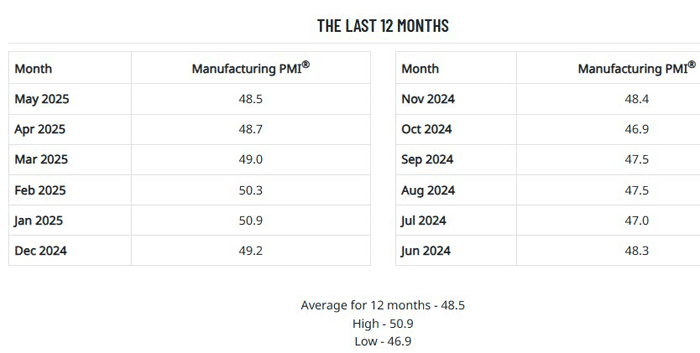The US Purchasing Managers Index (PMI) for May was released Monday by the Institute for Supply Management (ISM), and came in at a level of 48.5, down a little from 48.7 in April, and falling below the key 50 mark that separates US manufacturing expansion from contraction for 29 out of the last 31 months.
Supply Chain Digest Says... |
 |
|
| Another manager in the computers and electrics sector stated that: “Government spending cuts or delays, as well as tariffs, are raising hell with businesses. No one is willing to take on inventory risk.” |
|
 |
|
What do you say? |
|
| Click here to send us your comments |
|
| |
|
| Click here to see reader feedback |
|
|
|
Those two months of manufacturing expansion in January and February came after a long 26-month stretch of contraction – and now succeeded three more months below 50.
However, ISM says that the overall economy continued in expansion for the 61th consecutive month after one month of contraction in April 2020. The PMI itself tracks closely but not exactly with the overall US economy.
A Manufacturing PMI above 42.3, over a period of time, generally indicates an expansion of the overall economy, according to ISM.
The other PMI numbers we track were mostly negative.
The New Orders Index was again in contraction territory, registering 47.6, below 50 for the fourth month in a row following a three-month period of expansion. That was just 0.4 percentage point higher than the 47.2 recorded in April but still showing contraction, in bad news for future US manufacturing activity.
The May reading of the Production Index (45.4) was 1.4 percentage points higher than April’s figure of 44.0. The index however continued contraction in May for the third straight month after two months of expansion preceded by eight months of contraction.
The Prices Index registered 69.4, down 0.4 percentage point compared to the reading of 69.8 in April (above 50 = rising prices, so prices rose again but at a somewhat smaller rate).
However, the Backlog of Orders Index came in at 47.1, up 3.4 percentage points compared to the 43.7 recorded in April, meaning order books are declining, though a bit less so in May.
The Supplier Deliveries Index indicated a continued slowing of deliveries, registering 56.1, 0.9 percentage point higher than the recorded in April.
Supplier Deliveries is the only ISM index that is inversed, with a reading of above 50 indicating slower deliveries, which is typical as the economy improves and customer demand increases - or the reverse.
The Inventories Index registered 46.7, down 4.1 percentage points compared to April’s reading meaning companies in total decrease inventory in the month.
Said Susan Spence, Chair of the Institute for Supply Management, Manufacturing Business Survey Committee: “In May, US manufacturing activity slipped further into contraction. There was contraction in most of the indexes that measure demand and output have slowed, while inputs have started to weaken.”
(See More Below)
|
CATEGORY SPONSOR: SOFTEON |
|
|
|
|
|
As always, the ISM report provides a graphic of the PMI scores for the last 12 months, which as can be seen show the two months over 50 in January and February after a long stretch of contraction since November 2022. It is now averaging just 48.5 over the past year.

Source: ISM
However, of the 18 sectors tracked by ISM, just 7 reported growth in May. Listed in order of most growth, they are: Apparel, Leather & Allied Products; Petroleum & Coal Products; Plastics & Rubber Products; Electrical Equipment, Appliances & Components; Textile Mills; Computer & Electronic Products; Nonmetallic Mineral Products; Miscellaneous Manufacturing; Machinery; Chemical Products; and Primary Metals.
As always, there were some interesting comments from PMI survey respondents.
“The impact of ever-changing trade policies of the current administration has wreaked havoc on suppliers’ ability to react and remain profitable. Vehicle manufacturers have already rolled price increases into their products to protect their bottom lines but have not been as cooperative with their supply bases,” said one manager in the transportation equipment sector.
Another manager in the computers and electrics sector stated that: “Government spending cuts or delays, as well as tariffs, are raising hell with businesses. No one is willing to take on inventory risk.”
Finally, a manager in the fabricated metals sector commented that “Most suppliers are passing through tariffs at full value to us. The position being communicated is that the supplier considers it a tax, and taxes always get passed through to the customer. Very few are absorbing any portion of the tariffs.”
What are your thoughts on this ISM PMI? Let us know your thoughts at the Feedback section below.
Your Comments/Feedback
|

